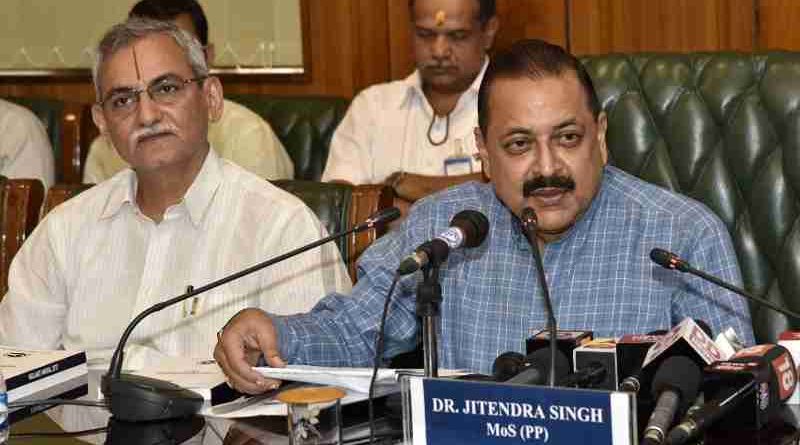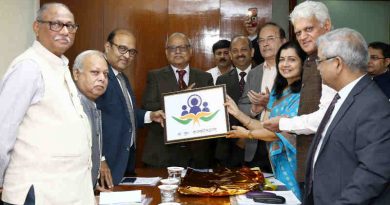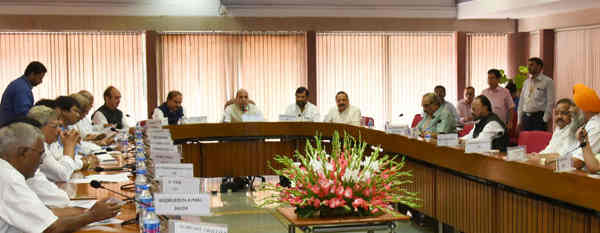Editorial Inputs for Research Project on Corruption in India: DoPT

Editorial Inputs for Research Project on Corruption in India
I have sent the following letter.
To January 12, 2022
Dr. Jitendra Singh
Minister of State, Ministry of Personnel, Public Grievances and Pensions
Department of Personnel and Training (DoPT) / Prime Minister Office (PMO)
Government of India, North Block, New Delhi 110 001
Dear Sir,
I am a national award-winning journalist and founder of the humanitarian organization RMN Foundation in New Delhi. As an anti-corruption activist, I publish The Integrity Bulletin news magazine, which covers local and international corruption news and issues. I also run “Clean House” anti-corruption service to report about crime and corruption in Delhi’s group housing societies where millions of people suffer because of extreme corruption and lawlessness.
As I have planned to compile a comprehensive research report on corruption in India, I need your response on the following queries to compile the report.
1. How does DoPT define corruption?
2. What process does DoPT follow to receive, investigate, prosecute, and resolve corruption complaints?
3. How many corruption complaints did DoPT receive and resolve in 2021?
4. How many convictions (including imprisonment) of culprits did DoPT ensure in the corruption cases it handled in the past 3 years: 2019-2021? Give details.
5. What mechanism does DoPT have to take action against the investigating officers (IOs) who do not investigate and perform their duties honestly?
6. Does DoPT allow complainants to file their appeals against the DoPT decisions in corruption cases to ensure proper administrative vigilance?
7. What mechanism does DoPT have to analyze the complainants’ feedback and improve its vigilance and prosecution processes accordingly?
8. Why does DoPT not have an end-to-end digital interface to interact with the complainants who are forced to send paper documents by post?
9. How does DoPT educate its staff on the evolving corruption concepts so that they could handle, investigate, and prosecute corruption cases efficiently?
10. You can add any other point from your side to explain the performance of your office.
You may please send me your response on the above queries on or before January 19, 2022. A concept note on the project is given below for your reference.
| Editorial Inputs for Research Project on Corruption in India Click the following links to read the letters |
||
| Lokpal | CVC | DoPT |
| Congress | ||
Concept Note on Research Project on Corruption in India
INTRODUCTION
While India is already perceived to be one of the most corrupt countries in the world, bureaucratic and political corruption is still increasing dramatically in the country. However, there is no reliable information available on the extent of corruption. This research project aims to compile a comprehensive report on diverse aspects of corruption. The findings of the report will help the central as well as state governments in the country make actionable strategies to combat corruption. The report will also target other stakeholders including businesses, political parties, and international organizations.
STAKEHOLDERS AND OBJECTIVES
The report will strengthen the anti-corruption efforts of the government agencies such as the Central Vigilance Commission (CVC), anti-corruption authority Lokpal, anti-corruption ombudsman organizations Lokayukta in different Indian states, the anti-corruption wing of the Central Bureau of Investigation (CBI), and other departments run by traditional bureaucrats.
The report will provide necessary inputs to the business community including industry associations such as the Confederation of Indian Industry (CII), the Associated Chambers of Commerce and Industry of India (ASSOCHAM), the Federation of Indian Chambers of Commerce and Industry (FICCI), and foreign business associations that operate in India.
In its international coverage, the report will enable the global anti-corruption organizations particularly under the UN umbrella and international lawmakers to understand the reasons and scope of corruption in India so that they could strategize their relationship with India in order to focus on the achievement of Sustainable Development Goals (SDGs).
WORKING TITLE
India Corruption Research Report 2022 (ICRR 2022)
RESEARCH REPORT COMPONENTS
– Evolving Corruption Definition and Scope
– Findings from a Primary Perception Survey
– Corruption Data from Secondary Sources
– Corruption Laws and Limitations
– Anti-Corruption Agencies and Functions
– Government-to-Citizen Interfaces and Limitations
– Role of Technology to Combat Corruption
– Interviews with Corporate and Government Executives
– Corruption Case Studies
– Major Corruption Cases and Trends
– Learnings from International Views and Trends
– Findings
PROJECT LEADER
The research project is being spearheaded by Rakesh Raman who is a national award-winning journalist and founder of the humanitarian organization RMN Foundation. These days, he runs global news services on different subjects and publishes The Integrity Bulletin news magazine that covers local and international corruption news and issues. He also runs various anti-corruption campaigns including an anti-corruption community court called “Clean House” to report about corruption cases that affect the people at large. Earlier, he had been associated with the United Nations (UN) through the United Nations Industrial Development Organization (UNIDO) as a digital media expert.
Appeal: Indian and international organizations as well as individuals are requested to support this project financially with their donations.
| You can click here to know more about this project and details for donations. |
Contact
Rakesh Raman
Editor, RMN News Service [ Website ]
Founder, RMN Foundation [ Website ]
463, DPS Apts., Plot No. 16, Sector 4
Dwarka, Phase I, New Delhi 110 078, India





